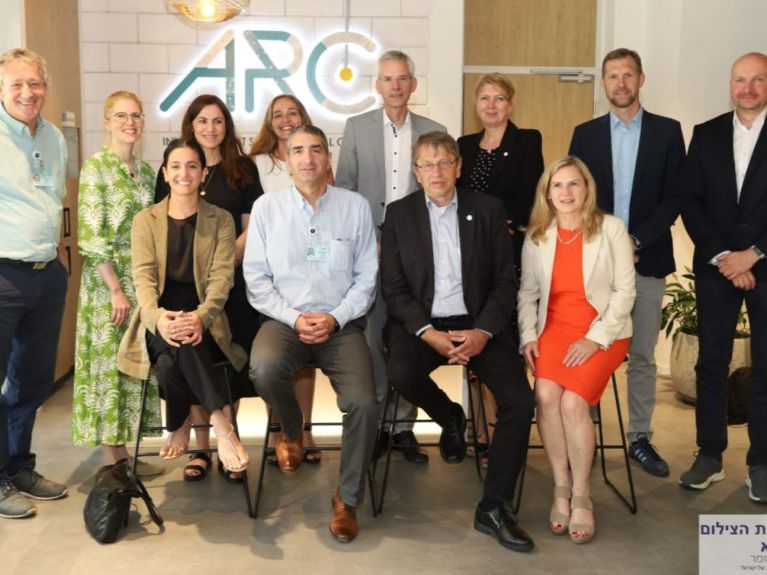“We combine the best of our two institutions”
Charité in Berlin and the Sheba Medical Center in Israel want to learn even more from each other in future and drive forward medical innovation together.

They are among the leading hospitals worldwide: Charité – Universitätsmedizin Berlin and the Sheba Medical Center in Israel. At the end of 2022, these two renowned medical facilities concluded an agreement to pursue a strategic scientific and academic collaboration with the aim of advancing innovations in medicine. One current focus is on research into Long COVID, but the two organisations are also collaborating closely in many other areas of research, including hospital IT. The cooperation between medical professionals in Germany and Israel has also proved capable of enduring the tense situation since the terrorist attack by the radical Islamist Hamas on 7 October 2023.
Sharing experience and learning from each other
A delegation trip in June 2022 marked the start of the German-Israeli cooperation. “We combine the best of our two institutions,” says Professor Friedemann Paul, Head of the Experimental and Clinical Research Center (ECRC), which is operated jointly by Charité and the Max Delbrück Center. Like his Israeli colleague Professor Joab Chapman, a neurologist at the Sheba Medical Center in Ramat Gan near Tel Aviv, he is involved in research into the causes of chronic inflammatory autoimmune diseases such as multiple sclerosis. The approach he pursues is known as translational, which means that new developments and findings are transferred to clinical practice as quickly as possible.
Charité benefits from Israel’s innovative strength as a start-up nation that is capable of putting new inventions and products on the market very quickly, says Paul. “What we’re able offer for our part as a cooperation partner is access to larger patient cohorts and also to big markets – a key issue for a smaller country such as Israel.” As the largest academic institution in Europe, Charité even has patients with very rare diseases, says Paul. “There’s no disease that is not the subject of clinical investigation here.”

But the collaboration between the two institutions goes beyond pure research. “In addition to specific projects being jointly pursued in the areas of research, teaching and healthcare, the aspect of learning from each other is vital in this international partnership,” says Dr Anna van Santen, Head of the International Office at Charité Berlin. “One of the key areas of the collaboration is sharing best practices in hospital management and IT.” At a meeting in February 2024, for example, the focus is on sharing information about invoicing and IT processes in outpatient care.
Collaborating closely on Long COVID research
One current focus is COVID diseases and Long COVID in particular. During the coronavirus pandemic, Israel was one of the leading countries in the development of vaccines. “We got to analyse a lot of the vaccination data,” says Chapman. He and his team are continuing their research to gain a better understanding of COVID diseases. “We don’t yet understand how COVID affects the brain,” says Chapman. “But Sheba and Charité collaborate at a very high level of medical research. We’re ideally placed to join forces in developing innovative solutions that will improve patient diagnosis and treatment.”
Sheba and Charité collaborate at a very high level of medical research.
Charité has set up a network of specialised surgeries and outpatient clinics for people suffering from post-COVID symptoms and the consequences of vaccinations. Similar to patients with multiple sclerosis, many of them suffer from fatigue, cognitive disorders or so-called brain fog, which can also involve memory loss. German and Israeli project teams are using imaging techniques to examine the brain structures of patients so as to detect changes and better understand the mechanisms associated with the autoimmune disease. “The aim of our collaborative venture is to help people who are ill,” says Chapman. “Our particular expertise at the Sheba Medical Center lies in the areas of big data, analytics and artificial intelligence.”
Close cooperation despite tense situation in the Middle East conflict
Although the escalation in the Middle East conflict is making collaboration more difficult to some extent, the two hospitals continue to work closely together. For example, there are plans to hold a workshop in Berlin in summer 2024 to bring together young researchers from the Sheba Medical Center and Charité. “The focus here will be on the use of AI to improve diagnostics in various areas of medicine,” says ECRC Director Paul. The difficult political situation is making things a little more complicated at the moment, he says. “But we’re still planning to have some early-career Israeli physicians come to Charité to take part in training programmes so as to support collaboration at the two institutions.” One possible next step would be to introduce so-called seed grants to lay the foundations for German-Israeli funding projects at European level, says Paul.
“We really appreciate this support from the strategic point of view, but it’s very welcome at the personal level, too,” says Sheba clinician Chapman, adding that Sheba is in fact a good example of peaceful coexistence since patients are treated there from all over the Middle East. People from the Palestinian Territories have been treated here, too. “We employ people who really want to help others – people who are looking to advance science and improve patient care,” says Chapman. But this is difficult in times of war, he adds. “That’s why it’s so important to us to have the support of Germany and the Charité at this time.”


